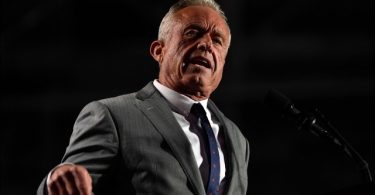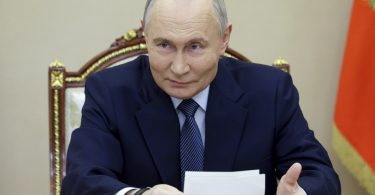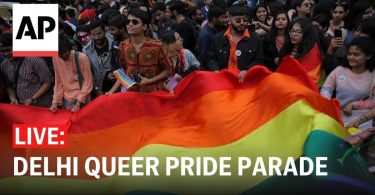Don Abram is the founder and executive director of Pride in the Pews, an organization that works toward LGBTQ inclusion in the Black church. The Black church was central to Abram’s upbringing in Chicago, and he argues that the well-being of Black queer individuals is heavily dependent on the Black church’s affirmation of LGBTQ identities.
What is Pride in the Pews, and why is it needed?
Approximately 850,000 adults in the United States identify as Black, LGBTQ, and religious. There’s no way to ensure that these folk are thriving in every area of life without considering the role of religion, and specifically the Black church. Scholars tend to associate the Black church with eight historically Black denominations, including the National Baptist Convention, the African Methodist Episcopal Church, the Church of God in Christ, and others. None of those denominations are affirming of LGBTQ folk. Zero out of eight!
Now, some people might ask, Why should I care? Why is this an issue that matters to me?
Religion is a social determinant of health. So if you actually want to ensure that your sacred sibling has equal access to care, to resources, then you should care about this issue. Empirical evidence shows that when Black LGBTQ folk belong to non-affirming communities, they are more likely to experience depression, anxiety, and suicidal ideation, and they are at higher risk for certain STIs and STDs. Organizationally, we partner with faith-based institutions and health-care practitioners to help them recognize that the way Black queer, trans, and nonconforming folk orient around religion impacts their ultimate health-care outcomes.
Pride in the Pews curates resources, convenings, and opportunities for continued conversation around the intersections of race, religion, sexuality, and gender.
Was seeing these intersections part of your motivation for starting Pride in the Pews? Tell us about your “this is why we should start this” moment.
In the summer of 2020, I was out in the streets with everyone else demanding justice for the brutal and reprehensible murder of George Floyd. As I was protesting, two questions came to mind. One was: Where is the Black church? Because I’m not seeing them in the streets, even though I see them in the sanctuary. Second: When they are out in the streets, are they advocating for LGBTQ folks, too?
It dawned on me immediately that the Black church cavalry was not showing up for the LGBTQ community. So I decided that I would create an organization that built that cavalry.
My entry into this work was never in service to the goal of making congregations affirming within the four walls of the church. It was in service to the life and vitality of the Black LGBTQ community. I recognized that the Black church was not operating in service of this fight for liberation and equity—and that one of the barriers was their lack of understanding, their lack of resources and tools in a language that resonates with the way that they worship and understand God. I saw the need for a translator who says here are resources, here’s the language, here’s why these issues are important and how you’re implicated—and now that you are aware, now that you are journeying toward full inclusion, let’s begin to think about what it means to leverage your platform, your privilege, and your positionality to better the material lives of LGBTQ folk.
Pride in the Pews uses a data-driven approach. How do you collect data, and what have you learned from it?
When Pride in the Pews launched, we started the Can I Get a Witness? storytelling project. We collected the stories of 66 Black LGBTQ Christians from across the country. Folk from the ages of 21 to 69 of every gender expression and identity were represented in that sample. We asked them to tell us about their lived experience in relation to the Black church and their faith. After collecting those 66 stories, we brought in researchers who analyzed those findings to help us find dominant themes so we could curate revolutionary models for churches to affirm the liberation of LGBTQ people of faith.
We were doing research to make the Black church affirming, but we discovered that there’s something more insidious and internal happening when folk hear that they are not loved by God and are banned to hell. It’s not simply making them feel bad; it’s resulting in negative health-care outcomes. I was surprised to find that a significant chunk of the people we interviewed had experienced depression, suicide, or self-loathing or had been diagnosed with HIV. We quickly realized that rejection from one’s church is connected to rejection of oneself, which can lead to many health issues.
What makes the storytelling approach compelling for you?
Some of it is strategic; some of it is theological. I’ll start with the theological.
The Bible says that we overcome by the blood of the Lamb and the word of our testimony. People of faith are people of faith because we heard a story. That tells me that there’s power in telling stories. Hearing a story can change your life. I believe that folk can change the trajectory of their life or how they relate to those they perceive as other because of a story. I’m less interested in converting or convincing someone of my humanity and more interested in holding space for our shared humanity through the telling of a story.
We collected 66 stories for the Can I Get a Witness project because there are 66 books in the canonized Bible. We believe in the inherent sacredness not only of the Bible but also of queer and trans stories. The stories of LGBTQ folk are sacred, and they have something to teach us, just as the Bible does—not only about God or the Divine, but also about how we relate to one another.
The other piece is strategic. Data shows that Black Christians are some of the most theologically fundamentalist Christians. When tackling a polarized topic like LGBTQ identity, it’s not a good idea to start with the Bible or theology. If you want someone not to get defensive and completely reject this thing called Pride in the Pews, you don’t start by completely deconstructing their beliefs.
The telling of a story lays the groundwork for honest, transparent conversation. Storytelling doesn’t start at the place where we differ; it starts at the place where we perhaps have shared experience. We won’t agree on everything, and we may not subscribe to the same theology, but we can acknowledge the humanity of queer and trans folk in ways that compel us to do better.
Were there any unexpected obstacles in starting Pride in the Pews?
One of the most challenging obstacles is religious illiteracy. Folk have a tendency to ask: Are you a religious organization, or are you an LGBTQ organization? They have a very difficult time seeing us as both. LGBTQ folk, as a result of religious trauma, can look at us with some distrust and say, You are connected to religious institutions that don’t serve us and have historically harmed us. Therefore, there’s an extra hurdle for you to convince us that factoring in religion is actually important. Because we only see it as doing harm.
On the other hand, philanthropic organizations and institutions sometimes say that they don’t fund faith initiatives. I’m attempting to name for them the fact that you cannot be in partnership with Black communities without being in conversation with the church. Many of these organizations don’t see the connections: they don’t understand religion as a social determinant of health, they don’t recognize the ways in which the Black church is central to Black life and access to resources. We have to do a lot of educating, to explain that we are working in churches but with a goal of churches leveraging their influence in the public square to advance a broader mission.
Organizations will say that they don’t know why churches are important or why we need to incorporate religious language. I’m trying to articulate that this is a part of cultural competency, part of meeting people where they are. To be effective for this population, which is over 70 percent Christian, you have to be able to speak their language.
It’s interesting that you have to tell some people with marginalized identities why the intersectionality of Pride in the Pews matters. It seems like they should be the first to understand.
Here’s the other thing I’ll name: it’s frustrating that LGBTQ folk have claimed figures for various purposes without acknowledging the fullness of their identities. LGBTQ folk who are secular, humanist, and Christian have adopted Pauli Murray as their own. We name the ways in which they were revolutionary as a groundbreaking legal scholar who contributed to jurisprudence in the United States. We would not have had the Brown v. Board of Education ruling without Pauli Murray. But we refuse to acknowledge the ways in which faith, which Murray talks about extensively, contributed to the work that they did and the ways they saw themself.
We also claim Bayard Rustin in the LGBTQ movement. We talk about how Rustin was an adviser to Martin Luther King Jr. and the ways in which he was instrumental in the March on Washington, but we never talk about his faith. The same is true for André Leon Talley, the first Black editor of Vogue and a lightning rod in fashion. He has opened up doors for so many, and yet we refuse to talk about his faith.
These figures changed the trajectory of America, the fabric of various industries—and they did it from their Blackness, their queerness or transness, and their faith. If we strip their faith from their legacy, we cannot truly honor them.
Name three songs you would include on a Pride in the Pews playlist.
Beyoncé’s “Church Girl,” Lil Nas X’s “Montero,” and Aretha Franklin’s “Respect.”
Tell me about the Black Church Equality Fellowship. How does it work? Who can apply?
The Black Church Equality Fellowship is a one-of-a-kind, nine-month leadership development program for Black faith leaders committed to LGBTQ inclusion. We offer a $4,000 grant to fellows to carry out LGBTQ-related projects in their congregational contexts. We also offer fellows training to leverage our Can I Get a Witness? curriculum. This helps churches identify where they are and create practical and concrete steps to advance inclusion substantively, structurally, institutionally, and interpersonally in their churches.
We’ve heard from our partners that one of the barriers to entry in this work is finances and another is capacity; they couldn’t hire someone, and they didn’t have the bandwidth to do it themselves. A third barrier is lack of access to information: they didn’t know how to find credible sources or scholars writing about LGBTQ affirmation.
We said, let’s create a fellowship program to tackle all of these barriers. In doing this, we’ve been able to reach an audience that has not historically engaged in this work. That includes pastors who may still be figuring out where they stand theologically. It includes folk who are on board with the work of Pride in the Pews but don’t know how to carry it out in a conservative congregation. It also includes congregations that are engaged in this work but want to take it to the next level.
Our particular emphasis is on churches led by straight-identifying Black pastors. That’s because we want to create a space where they can question, be curious, and engage in internal reflection about how they do this work. We want them to think about ways to leverage their positionality but also to recognize the ways in which their positionality has precluded them from bearing witness to the lived experiences of LGBTQ folk.
What’s up next for Pride in the Pews?
In February, we will be at Spelman College, hosting our third annual State of the Black Church Symposium. We’re really excited to be able to partner with a historically Black college like Spelman, so they might be able to deepen their own engagement around this topic.






